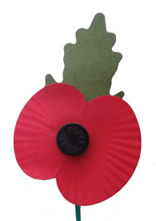A War Less Ordinary
 Richard Armitage was one of the readers in a BBC radio programme about non-combatants in war-time.
Richard Armitage was one of the readers in a BBC radio programme about non-combatants in war-time.
A War Less Ordinary was broadcast on BBC Radio 2 on Saturday 10th November 2007 as part of the BBC's range of programmes marking the weekend of Remembrance Day. Using poetry, song and archive recordings, it commemorated the work of those who did not fight in war-time, but who nonetheless contributed to the war effort in Britain during the two world wars.
Non-combatants were mostly, though by no means exclusively, women. Their traditional wartime role had been to remain at home, waiting for their menfolk to return from the fighting. They knitted socks, they wrote letters, and they waited for letters. But during the two world wars, this had to change and women went into the industries that were normally staffed by men, working as anything from bus conductors to welders to munitions workers.
In the Second World War, some served in the Auxiliary Territorial Service (ATS), providing support services in the army (the daughters of both the King and the Prime Minister joined the ATS - Princess Elizabeth and Mary Churchill respectively). Others worked in the Women’s Voluntary Service, which supported the emergency services. “Land girls”, members of the Women’s Land Army, took the place of male agricultural workers to keep up the production of food for the nation. And in both wars, many young women worked in hospitals as VADs (Voluntary Aid Detachment).
But many non-combatants were men. Those who were too old, too young or too ill to fight often joined the Home Guard (‘Dad’s Army’) guarding the Home Front in case of invasion. Some young men, instead of being conscripted to fight, were sent to work in the coal mines. Known as Bevin Boys, after Ernest Bevin, the Minister of Labour, their work was hard, dangerous and largely unrecognised. And then there were the conscientious objectors, who refused to fight on moral grounds and were often imprisoned.
The contributions of all of these were noted in the programme. But so too were those of the animals used in war, for example, the horses who pulled the gun carriages in World War I.
The programme was introduced by Sarah Lancashire, and the readers were Richard Armitage, Susan Jameson and Charlie Brooks.
A War Less Ordinary was chosen as Radio Choice for the day in The Observer (4th November), Stephanie Billen saying, "This worthwhile programme celebrates the war contribution of non-combatants from medical staff to ARP wardens. Their work is celebrated in poetry and song in a feature that also reminds us how families pulled together to write letters and send parcels to soldiers and how even animals played their part with horses pulling gun carriages in the First World War. Bravely and controversially, the programme also considers the sufferings of conscientious objectors."
It was also Radio Choice in The Sunday Telegraph (4th November). Gillian Reyonolds called it "a vivid documentary on non-combatants, medics to sock-knitters, in poetry, song and archive interviews."
Excerpts from the programme...
Further information
The BBC History website has two sections, Home Front: World War One and Home Front: World War Two that give more information about British non-combatants' experiences in the two world wars.
